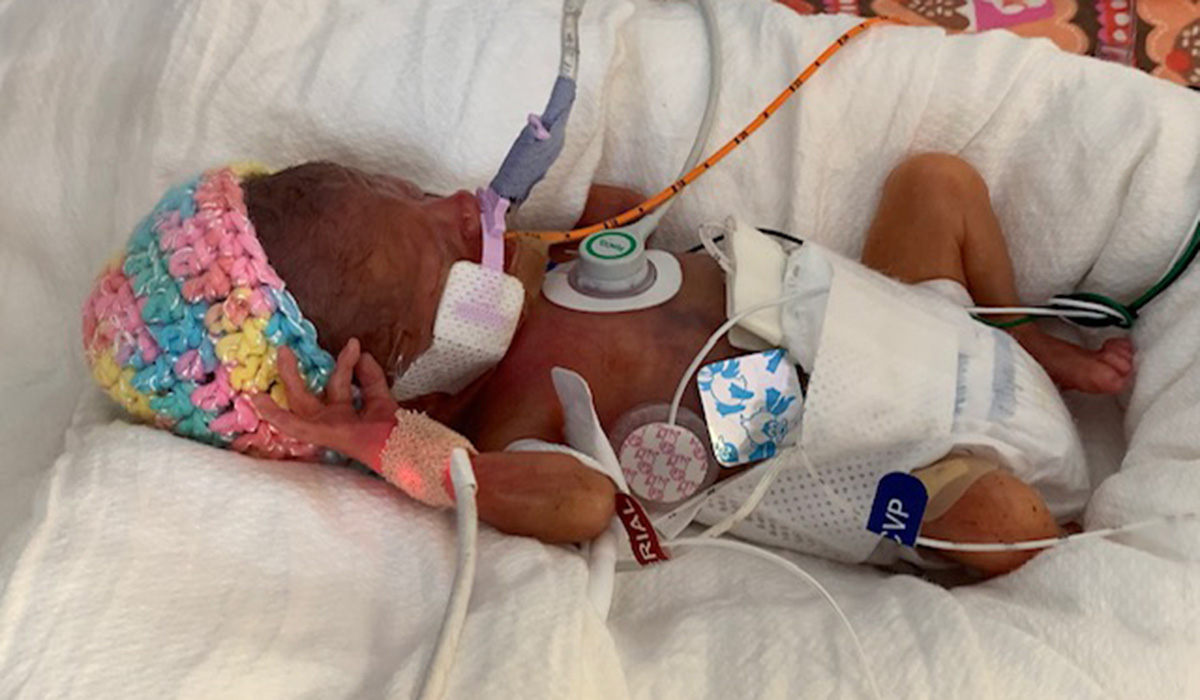“Miracle baby” is a term used often in the NICU by parents who watch their baby battle for life, conquer all odds, and survive. For Gabby Ashworth, “Miracle Baby” means more than most of us can imagine. Gabby’s parents, Nathalia and Aaron, believe Gabby is proof that miracles do exist and they pray those miracles continue. “The odds she beat are incredible. The amount of miracles during her journey is phenomenal.”
Gabby’s journey began last February when her parents traveled from their home outside of Boston to St. John to celebrate Gabby’s impending arrival. They weren’t expecting Nathalia’s water to break early or for her uterus to be infected. She was taken by boat to St. Thomas, where they spent a night at the hospital, before being airlifted to Miami for an emergency C-section. Gabby was born prematurely at 24 weeks, only 1 lb & 1 oz and with a lot of infections.
Nathalia said, “The first month was the worst. I thought I’m going to get a call that she didn’t make it.”
 Gabby had respiratory distress, acute organ failure and seizures. She also had NEC, a serious intestinal disease, twice… the first time, treated with antibiotics and the second time, surgery to remove part of her intestines.
Gabby had respiratory distress, acute organ failure and seizures. She also had NEC, a serious intestinal disease, twice… the first time, treated with antibiotics and the second time, surgery to remove part of her intestines.
“It was horrifying. We didn’t know the world of the NICU existed. It was one thing after another. I had a lot of anxiety. I felt claustrophobic, as if the walls were coming in,” said Aaron.
Then during that first traumatic month, the COVID pandemic hit. The visitation policy at Holtz Children’s Hospital changed to twice a day for 3 hours and only 1 parent per day. Nathalia said it was much more terrifying being alone, bedside, while their daughter fought for her life.
“It was one step forward and 20 steps backwards. We were looking at the monitors constantly. She would have Desats and Bradys constantly. Every day the doctors would come and tell me something else was wrong, something new. She was immunocompromised and fragile.”
Nathalia and Arron had to take turns visiting Gabby. The only positive effect of COVID was Aaron being able to work from their rented apartment in Miami and visit Gabby instead of returning to his job in Boston. They were fortunate to set up a temporary home in Miami, thanks to a Go Fund Me account established by family, friends, and co-workers. They had arrived in Miami with just 2 carry-ons of beach attire. Aaron said having their living costs subsidized, enabled them to focus on their baby girl.
“I didn’t know if she would live or what would happen. It was like navigating a boat in the fog without GPS.”
ICU baby volunteers met the Ashworths in the NICU before COVID and then continued to speak with Nathalia every week as the Parent-to-Parent Support program transitioned from bedside to tele-support in the aftermath of the pandemic.
“You feel so alone in the NICU. Not being from Miami with family caring for me. Having an ICU baby volunteer listening to me is what I needed at that moment. No one else could truly empathize with what I was experiencing.”
While ICU baby was a support to the Ashworths, they craved home, friends and family. Finally, after 4 months in Miami, they were approved for a transfer to Boston. Just days before they were scheduled to leave, Gabby developed an infection in the brain which led to an abscess and surgery to drain the fluid, meaning 2 more weeks in Miami.
“We lived on adrenaline… constantly on edge. We were in fight or flight mode without time to process what was happening.”
But finally in mid-June they were granted an AirMed flight and Gabby was transferred to the NICU at Boston Children’s Hospital (BCH) where she stayed for 3 months. The time at BCH wasn’t without challenges. Gabby was diagnosed with additional brain injuries, airway obstruction leading to surgery, and a false-positive COVID test sending them into 3 weeks of isolation.
“Our lives were predicated on who would be at the hospital and when. I was more of a nurse or caretaker than a mom.”
Gabby’s next stop in her journey was Franciscan Children’s, a rehabilitation facility where they focused on weaning her respiratory support. Finally, after a 1 month stay, now 8 months old, Gabby was discharged. But it wasn’t a completely happy ending… a reality that some NICU parents face.
“We were overwhelmed with the amount of medical equipment in our Living Room. It was like the NICU at home.”
Gabby needs a BiPAP machine, an oxygen tank and a feeding pump. She has a tube that goes directly to the intestines and reduces reflux and aspiration.
“Gabby is complex” says Nathalia, with both laughter and sadness.
As if that weren’t challenging enough, follow up tests detected hearing loss and genetic testing showed a missing gene on the x chromosome which affects stature and height. The impact is unknown.
“This journey has been teaching us to be present. We can’t plan. We don’t know what the future will be. Will she walk or talk? I can’t worry about something I can’t control. One day at a time. One foot in front of the other.”
A life lesson for all of us.

